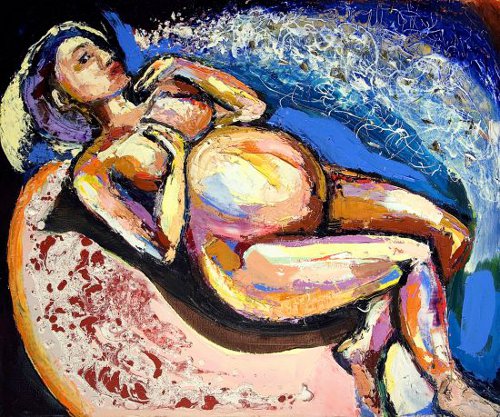The Daily Mail’s front page today talks about the fertility warning to women over 37 and how doctors have warned that celebrities who have children in their 40s are giving women false hope about motherhood. They say the celebrities who parade ‘miracle babies’ will often have used IVF or donor eggs. And – because they do not make this public – their fans fail to realise that fertility declines dramatically after the age of 37.
Most of us know women that have had, or are having, fertility problems; whether they’re over 37, or under. So we reached out to the The Life Adventure Community to ask their thoughts on the subject and one lady, Sarah, kindly stepped forward to talk about her own personal journey. Unable to conceive and thinking that IVF was her only route, she’s recently been intrigued by the suggestion of a close friend to try an acupuncturist. We asked Sarah if she’d send us her key questions and concerns so that we could pose them to one of the country’s top Fertility specialists, Emma Cannon, author of the ‘Baby-Making Bible’ and Fertility to Family’. London-based Emma uses acupuncture as a form of fertility treatment and has kindly offered to answer Sarah’s questions. We hope you’ll find as insightful as we did.
Read MoreSarah: “How can acupuncture help conception? Does it do anything physically or is it more about the mind?”
Emma: ‘”I have described this in many different ways over the past 21 years but simply put, acupuncture helps return the body towards normal function. How successful acupuncture alone can be really depends on how deviated from normal function the body has become.
Scientifically there have been several papers demonstrating that having acupuncture during IVF increases the chances of a live birth. These studies have been repeated several times, but usually by medics not acupuncturists, so there have been some issues with methodology of the papers. However I work hand-in-hand with western medicine and IVF units, many of whom refer their patients to me for support during IVF. Acupuncture increases blood flow to the uterus and helps to improve the endometrium, I am often asked by units to help with endometriums that are slow to get to the correct thickness.
Acupuncture has also been shown to increase activity in the hypothalamus, which is the part of the brain that controls hormones. There are studies on using acupuncture to initiate ovulation in anovulatory women. I would say it is less about the mind – or lets say equally mind and body – really, they are not separate. At some point western medicine will reach the same conclusion; that the mind and the body are interdependent.
In terms of the mind – yes acupuncture can help relax the patient and calm the mind and of course there is the additional benefit of the placebo effect which is present in EVERY type of medicine (more of this later).”
Sarah: “How quickly can it help?”
Emma: “This is a complex question. As I mention above, it totally depends how deviated from normal the energy is. Additionally sometimes the effects are immediate if the treatment is directed in the right way. Morning sickness patients often walk out sickness free. Very often a patient walks out without the headache they arrived with, or they go to the IVF clinic and the follicles are growing better or the lining has inexplicably reached optimum thickness.
Of course there are also many cases where change is slow – it really depends so much on the issue and something’s will not improve with acupuncture and need western medicine. The skill I have developed is knowing when it is worth trying to treat with acupuncture and other supporting methods, and when western medicine is needed and when both can be used together.
It also depends on the practitioner and to some extent the patient – people respond differently.”
Sarah: “How frequent should treatments be?”
Emma: “I see people weekly for 6 weeks then review. In IVF I develop a protocol to suit the individual patient depending on my findings and their history
Sarah: “Do the needles hurt?
Emma: “Sometimes, but nothing too bad. They are much thinner than a hypodermic needle and if there is a sensation it is often a heavy dull ache.”
Sarah: “Whereabouts on the body do the needles go?
Emma: “ To the stomach, hands, feet – can be anywhere really but commonly those places”
Sarah: “Will the treatment work if I don’t believe in alternative medicine? (Up to now I have been very sceptical and thought it was just a placebo effect and if I didn’t believe in it, then surely it wouldn’t work).”
Emma: “Acupuncture works as a stand alone and as a support for IVF and other ART protocols. It is not a cure all and works for certain conditions better than others. The way that I practice acupuncture is hand in hand with western medicine and is therefore in a category called Integrated Medicine. I am not an advocate of the term ‘alternative’ which suggests there are 2 types of medicine as (a)Western that is based on science and (b) all the rest which is an alternative to Western medicine.
The way forward for medicine is to understand that each system has strengths and weaknesses. Western medicine is based on science and science by its very nature may prove what is believes to be true today to be wrong tomorrow – it is ever evolving and therefore as it goes along it adopts many of these practices and brings them into the scientific arena. This is precisely what is happening with nutrition and acupuncture. There is much scientific evidence to back this up. There needs to be more but there is little finance available for long-term studies (which drugs companies normally pay for).Acupuncture works on horses and also on babies – so it isn’t only placebo. However, it is partly placebo; this is true of many drugs which show very little difference to the placebo version. It is hard to separate placebo from medicine as it is always present. I think the interesting point is not – ‘it’s placebo so not important’ but ‘placebo exists – how can we best harness that to help patients become well’.
So I guess the answer is Yes and No. You don’t have to believe or even understand – there will be a measurable effect without belief. But after 21 years and 40,000 hrs in practice and also as a patient myself (I had breast cancer ) – beliefs can help every journey we take in life and is of paramount importance to human survival.”
Sarah: “What can I do to support the treatment – diet/exercise/breathing etc?”
Emma: “Anything that helps relax the mind and makes us feel happy is good. When we are happy we release brain chemicals that make us feel safe, which puts us in an optimal place to conceive. Reduce exercise – but walking and gentle exercise is fine. Also seek to reduce your work load. I have a downloadable e-book Fertility to Family – on my website which has guidelines for eating through IVF.”
Sarah: “If I am pregnant but don’t know about it (i.e. less than 4 weeks) can acupuncture harm the babies’ development?”
Emma: “Acupuncture is widely used in pregnancy in fact one of the most researched points is P6 which is for morning sickness. It is perfectly safe and supportive for pregnancy, although some acupuncture points are contraindicated. Every acupuncturist knows these (except western medically trained acupuncturists who are taught that all points are ok to be used during pregnancy).”
Sarah: “How do I find a good practitioner? Are there any qualifications I should look for?”
Emma: “Go to the British acupuncture council BAcC. Or go for a personal recommendation or ask your clinic if they work with any acupuncturists.”
Since giving us her questions, Sarah has embarked on the acupuncture treatment suggested by her friend, near where she lives, outside London. Despite being very aligned with western medicine, she writes “I have really surprised myself by how good I feel mentally and physically, she has totally helped me get to a better place that will hopefully help me conceive. But bizarrely I’m not even worrying about that, instead I have been thinking more about my body and mind (and how they are connected) and trying to listen to my own body more – something I think we forget to do when we have busy lives.
When we fed this back to Emma she replied how “listening to your body is a good thing; a GREAT thing. I wish more women did this – we become too reliant on outside influences – but we are deeply wise and come from a line of many women before us – each with their own unique wisdom”.
Read more from the Daily Mail on this subject here.
A huge thanks to Emma Cannon and to Sarah for being so candid and sharing her journey and fears with us.

